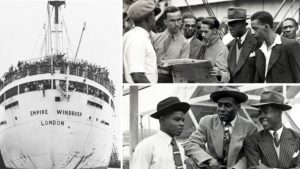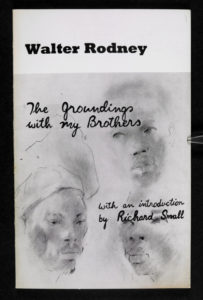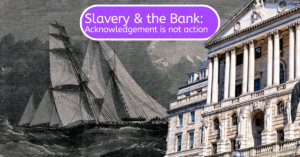|
Getting your Trinity Audio player ready...
|
Reading Time 7 mins
August 23, 2022
BOOK SYMPOSIUM: Hilary McD. Beckles, How Britain Underdeveloped the Caribbean: A Reparation Response to Europe’s Legacy of Plunder and Poverty: Kingston, University of the West Indies Press, 2021, 292 pages: ISBN 9789766408695 (Paperback)

Marchers in London, England, call for reparations to be paid by former slave-owning countries. © Wiktor Szymanowicz/Barcroft Media/Getty
“It is the British who by their action in past centuries are responsible for the presence in these islands of the majority of their inhabitants, whose ancestors as slaves contributed millions to the wealth of Great Britain, a debt which the British have yet to repay.” Sir Arthur Lewis
All four of my grandparents, like others throughout the Caribbean, took action in the early years of the 20th century. They were part of the hundreds of Barbadians and others from the British WI who left the area to escape extreme hunger and malnutrition and emigrated to “America.” Though they are not even in a historical novel, they are not fictional characters. I grew up with them and called them Granny, Grandpa, Grampy, and Nana.
Dr. Beckles’s, How Britain Underdeveloped the Caribbean: A Reparation Response to Europe’s Legacy of Plunder and Poverty provided an epiphany. The white supremacist policies, the “lazy negro” tropes, and the mass murder of West Indian freedom fighters crystalized in my mind that “dear ole England” was trying to nullify my existence proactively—and I took it personally. I reflected on and honored at a deeper and more informed level the characteristics of my ancestors that insured my existence. I was grateful for their steadfastness, mental and physical strength, and drive to survive and thrive. I mourned their struggles and individual battles with a system that saw them as mere cogs in the British colonial wealth-generating behemoth. I was inspired.
Equally inspiring and infuriating was the plight of the residents of the British West Indies more than a half-century later. Seeking to escape from the absence of life-above-subsistence levels intentionally instituted by British policy, West Indians heeded the call from the epicenter of colonial power, emigrating to rebuild devastated post-war Britain.
 Once again, the British transported colonized people on boats to toil and generate wealth for and save the Empire. Disembarking from the ship Empire Windrush in 1948, the workers diligently helped to repair the United Kingdom. They remained in place for another seventy years, raising families, contributing to the economy and culture of England, and being “English.” Subsequently, in 2018, British authorities started using immigration laws passed in 1973 to challenge the citizenship of the Windrush generation and their descendants.
Once again, the British transported colonized people on boats to toil and generate wealth for and save the Empire. Disembarking from the ship Empire Windrush in 1948, the workers diligently helped to repair the United Kingdom. They remained in place for another seventy years, raising families, contributing to the economy and culture of England, and being “English.” Subsequently, in 2018, British authorities started using immigration laws passed in 1973 to challenge the citizenship of the Windrush generation and their descendants.
“Inglan is a Bitch!”
The British government treated these saviors of the Empire as noncitizens and initiated and completed deportation processes, sending these Black British to the Caribbean. However, after massive agitation, in 2019, the British government devised a program to compensate people mistakenly “detained or removed by the UK.” The Windrush fiasco revealed that the British never accepted West Indian people as part of England. They were forever other, less than unappreciated. Thus, after providing critical service to keep Britain afloat from the post-WWII era to the early twenty-first century, the “mother” country did not protect these Black Brits. Little wonder Linton Kwesi Johnson’s precise grasp of history rhapsodized, “Inglan is a bitch, dere’s no escapin it.”
Beckles provides meticulous and robust evidence to substantiate the book’s thesis. He asserts: “For the robber to argue that what had been taken should not be returned to the robbed because it would be put to improper use speaks to the nature of the white-supremacist thinking at the core of British Empire policy” (153). It is clear who’s the “robber” and who’s the “robbed.” Beckles’s knack for breaking down issues and making them easily accessible to readers is clearly on display—and is a subtle strength hiding in plain sight.
Afternoon tea. “Stiff upper lip.” English gentility. “It’s not cricket!” The Royal Family. Queen Elizabeth. Beckles accuses the English of “…three centuries of native genocide, black chattel enslavement, Indian indentured servitude, and the overall crimes of colonization.” The historical contradictions of British doctrines are laid bare in this riveting text. Each paragraph is a surgical strike that topples the palace walls built by extracting wealth from enslaved African labor. The concept of “colonialism” is exposed as a dehumanizing, murderous policy in the British West Indies.
 Beckles’s deft analysis flows from a deep engagement and appreciation of writers who provided the theoretical underpinnings for his bold analysis. The author builds on Walter Rodney’s assertion in The Groundings with My Brothers: “The West Indies and the American South share the dubious distinction of being the breeding ground for world racialism.” Both empires used this racialism to rationalize African people’s exploitation and ascend to their lofty positions.
Beckles’s deft analysis flows from a deep engagement and appreciation of writers who provided the theoretical underpinnings for his bold analysis. The author builds on Walter Rodney’s assertion in The Groundings with My Brothers: “The West Indies and the American South share the dubious distinction of being the breeding ground for world racialism.” Both empires used this racialism to rationalize African people’s exploitation and ascend to their lofty positions.
Beckles’s book grabs you by the chin and turns your head to stare at planned, intentional strategies informing three hundred years of colonial rule. But unfortunately, these effects are still causing turmoil in the lives of people in the Caribbean and other areas under colonization, including Blacks in the United States.
The British were the first European investors to classify enslaved Africans as non-human and, consequently, brought about the death of approximately 80% of the Africans forcibly shipped to the British colonies in the West Indies during the Middle Passage. After the British colonies “abolished” slavery, locally based governors, as representatives of the Crown on the islands in the Caribbean, instituted a “Reign of Terror” to derail future quests for freedom and self-governance. Britain held steadfast to the motto, “Not a nail, not a horseshoe,” to eliminate potential competitors in the international manufacturing marketplace. Britain fought to maintain the mercantile-based monopoly they created around the globe through protectionism, strong arm economic, and physical tactics.
You will raise your eyebrows when the text reminds us that after the British slave trade ended in 1807, the UK brought to the British West Indies workers from India to perform similar tasks on the same plantations as enslaved Africans performed in the past. As a result, uninterrupted profits flowed continuously to British investors and the British government, contributing to a high standard of living for the British populace. Yet government after government circumvented its moral– truly Christian responsibility to follow the Golden Rule rather than the road to golden treasures.
Your blood will boil when you realize the British government is not against the concept of reparations. But, of course, to them, it depends on who is on the receiving end. For instance, the British Abolition Slavery Act of 1833, wherein the British government paid the ENSLAVERS of African people in the British colonies, Mauritius, and the Cape of Good Hope £20 million (worth approximately £76 billion in 2010) for the loss of their property caused by the abolition of slavery. Beckles expands on the second part of this Act, and you will shake and weep in anger and make plans to take action today.
Dr. Beckles wished his book to “provide a reliable vehicle for the return journey to the progressive, anti-colonial side of the West Indian development narrative.” That is, away from the regressive, pro-colonial side of West Indian growth and development. It is a call (figuratively) to arms. We feel these emotions because we reflect on the seething emotions from the book.
Sir Hilary is an accomplished all-rounder cricketer, an exceptional cricket analyst, and a key player in setting up the Center for Cricket Research at UWI. He knows how to analyze, dissect, and attack opponents. Unsurprisingly, he imposed his will on this book and left his targets defeated and exposed.
Can a country that ruthlessly extracted wealth from the British West Indies come to terms with its callous indifference to humanity? And would that country listen to the rational, compelling, comprehensive arguments outlined in Beckles’s book? Or, would Britain ignore good sense and reasoned discourse and maintain that the independent BWI countries of the 21st century need to stand only on their own two feet today, accepting the pillage?
Will Beckles’s ideas signal and usher in the demise of the seemingly impenetrable wall of centuries-old white supremacy? We are legitimately fighting for our lives in the former colonies—not to get shot but to keep women in control of their bodies, to live where we want, and to receive high-quality education and healthcare. Will this book awaken compassion, remorse, and a sense of fair play and justice in a Britain that purposely underdeveloped the Caribbean? Ill-gotten wealth continues to prop up an increasingly irrelevant colonial power. May the gap between Britain’s insincere ideals and the realities of British plunder be eliminated.
 People in the Caribbean and people of Caribbean descent globally are millions in number. We are still here. Britain’s efforts to erase us have failed, and now
People in the Caribbean and people of Caribbean descent globally are millions in number. We are still here. Britain’s efforts to erase us have failed, and now
builds on the ideas advanced by Marcus Garvey, Arthur Lewis, Eric Williams, C. L. R. James, George Beckford, Walter Rodney, and others and provides an updated strategy for reparatory justice.
When this book is disseminated into every nook and cranny of the Caribbean and around the world—where The People and the self-anointed prestigious congregate–momentum will grow exponentially toward settling the international debts accumulated over centuries. Will Britain pay? If they do, will the dominoes fall soon after that: the United States, Portugal, Spain, France, and so on?
Reparations today! Reparations tomorrow! Reparations forever!
_ _ _ _ _ _
 Carlyle G. Leach is an educator and author of the memoir, Six Days in December: My Father’s Journey Home. He is passionate about family, social justice, playing trumpet and flugelhorn, and coaching youth baseball. Follow him on Twitter @CarlyleLeach.
Carlyle G. Leach is an educator and author of the memoir, Six Days in December: My Father’s Journey Home. He is passionate about family, social justice, playing trumpet and flugelhorn, and coaching youth baseball. Follow him on Twitter @CarlyleLeach.

Fabulous cuz! So well captured; proud to be of Barbadian and Vincentian roots.